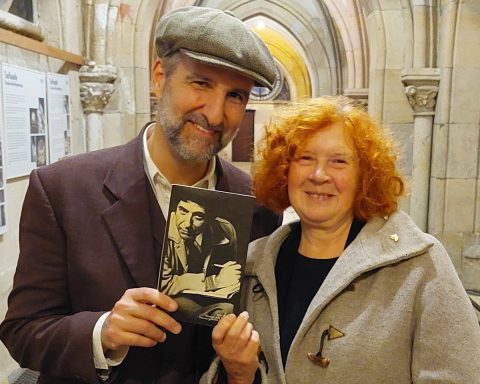In this interview, Dr. Thomas B. Fowler speaks about his relation with Xavier Zubiri, considered one of the most influential philosophers of the 20th century, and explains to the main public complex questions of mathematics, logic and physics – fields to which he has he devoted all of his life.

Felipe Cherubin: You had the privilege of knowing Xavier Zubiri. What are your memories of Zubiri as a man, a thinker and a friend?
Thomas Fowler: Zubiri was always kind, humble, and interested in the opinions of others. When I visited him in Madrid for the first time, in 1978, he did not know me at all but welcomed me into his house and took me out to dinner with his wife and his cousin. I only knew about part of his philosophy then (I had translated Naturaleza, Historia, Dios), but he patiently explained many of his new ideas to me, and told me of his meetings with Einstein, Heisenberg, and others. He was never arrogant or haughty, and clearly believed that the pursuit of truth was the most important thing in his life.
FC: How was [and has been] the reception of Zubiri’s thought in the USA?
TF: The United States is very much in the British empiricist tradition, so there is unfortunately not much interest in continental philosophy of any sort. Even major figures such as Hegel are neglected, despite the obvious problems with empiricist/positivist philosophy. So while there are a few places where there is interest in Zubiri, it has been difficult to make headway.

FC: Your article “The Development of Mathematical Thought as Confirmation of Zubiri’s Noology” confronts Kant and Zubiri, both philosophers concerned with mathematical and physical issues. In it, you said that Kant failed. What exactly do you mean with “Kantian failure”?
TF: Kant failed because he was still under the impression that Euclidean geometry is the only possible way to understand the world, as it represents the way that the mind synthesizes experience according to Kant’s categories. The development of non-Euclidean geometry showed that Euclidean geometry is just one possible mathematical system. Of course Einstein later incorporated non-Euclidean geometry in his General Theory of Relativity, thus demolishing Kant’s position entirely.
FC: Among scholars and supporters of the Zubirian philosophy, the mathematics aspect is, by far, the hardest part to understand. To clarify it for Zubiri scholars who are starting their mathematical studies, how would you put it in simplified form and a few lines, the advances and legacy of Gödel, Church, Turing, Lebesgue, Hilbert, Banach, Singer, and Mandelbrot – in order to confirm Zubirian philosophy?
TF: There are two aspects to this question.
(1) The reality of mathematical objects. (Since Plato mathematicians and others have believed that the objects of mathematics, that about which we reason and prove theorems, are real.) Plato put them in some ideal realm. Aristotle rejected this view but never satisfactorily explained their status. Zubiri was able to resolve this question by his notion of real by postulation.
(2) Mathematics is not static (as Kant believed), but quite dynamic. New theorems are proved, and often advances are made by relaxing earlier requirements or assumptions. When a mathematician postulates something, he is making a statement about reality, and what mathematicians do is to explore this postulated reality. The new worlds revealed to us by Lebesgue and Mandelbrot, for example, show this clearly. This is Zubiri’s legacy – how to understand what mathematicians do and how it relates to reality.

FC:Gödel’s theorem has become a modern fetish and led to many kinds of crazy interpretations. Alan Sokal’s book Intellectual Impostures exposes the abuses of modern philosophers explaining physics and mathematics concepts incorrectly, especially Gödel’s theorem. As a mathematician, do you believe that the difficulty of people in general to understand those difficult concepts of the sciences led to a new “sophistic wave?” Given your expertise in “exact sciences,” which in fact Gödel discovered, what would you say the expression “Gödel’s paradox” means?
TF: The problem that occupied Gödel was that of completeness: it had been assumed, since the time of Euclid until 1931, that mathematics was complete in the sense that any true statement could be proved. Thus truth and provability were essentially synonymous in mathematics; no one seriously doubted this, though things such as Russell’s Paradox led to some unease.
Gödel’s theorem shattered this link – we now know that there are true statements that are not proveable: “Gödel’s paradox,” I assume you mean. The presumed link between truth and proveability actually obscured the nature of mathematics and its objects. Zubiri was able to use Gödel’s result to rethink the whole question of the reality of the objects of mathematics, and what mathematicians actually do, thus clarifying the issue once and for all.
Sokal is no doubt right that science and mathematics can be abused and through incorrect interpretations used to support various ideological positions. Science has enormous prestige in our society so naturally there is a temptation to do this. Zubiri has shown the way forward, but I’m afraid that most people do not want to invest the time in learning about such difficult subjects and what they may mean. This is true even of philosophers, who should know better.
I recently reviewed a book by a Thomist who was worried about the meaning of surds (irrational numbers). That is ridiculous – they don’t have any meaning, they just are. The real message of mathematics lies elsewhere, as Zubiri has pointed out.
FC: How does Zubirian philosophy engage with Newtonian theory, the theory of relativity and quantum theory?
TF: Newtonian theory was based on old ideas of causality. Zubiri realized that the development of quantum mechanics implied a revision to those ideas. Specifically, he realized that deterministic causality (strict determinism) is too strong; science can proceed with statistical causality. More importantly, he realized that the notion of causality itself is broader than earlier philosophers maintained.
Determinism is merely one type of causality, and one that really only applies in limited domains. Science uses the broader notion of causality that Zubiri terms “functionality:” some things in nature are best described as functions of others, where “function” means any variety of mathematical functions, not necessarily one that implies determinism. Relativity theory did not introduce statistical functionality as did quantum mechanics, but it did reveal that many old notions such as absolute space and time are not viable, and must be replaced with broader notions. This accords with Zubiri’s ideas about science advancing by postulating new entities in the canon of reality.
FC: As a mathematician and Zubiri scholar, how do you analyze the “Higgs boson” discovery and its consecration by the Nobel Prize? In what aspects does the discovery confirm Zubirian philosophy?
TF: The discovery of the Higgs boson is an interesting case. Unfortunately it cannot be corroborated since only the team at CERN has a machine powerful enough to do the job. So for the moment we have to take their word for it.
But the real issue is that the current model of forces and particles (including the Higgs) is known to be incomplete in significant ways – we don’t know what dark matter is, nor do we know what dark energy is. This actually shows how Zubiri’s ideas about science correspond to what scientists actually do: they seek to enlarge the canon of reality by postulating new entities, and then verifying their existence.
FC: Zubiri left his work organized in a systematic (and didactic manner) to a certain point. What challenges do you see to integrating his philosophy into a whole intelligible model, or to understanding his legacy as a whole in a more comprehensive way?
TF: I think that the issue is how to expand Zubiri’s ideas to more areas. He left a basic framework in Sentient Intelligence, On Essence, and the theology trilogy. But he could not address every possible issue – knowledge is too broad and new developments are always happening.
So the real challenge is not to understand his legacy in a more comprehensive way, but to expand it to cover new areas. For example, a while back I wrote on the subject of the reality of political systems, and how they are an example of something real by postulation. (The Roman Empire was once something very real, but no longer is so.)

FC: Art and literature can reveal the deepest personality of humans. Who are your favorite artists showing the mystery of human nature?
TF: As Zubiri noted, art and literature are two ways, in addition to science, to penetrate reality and reveal it to us. People have always felt that music can transfer them to a new realm. But the same is true for all the arts: Standing in front of a great painting such as Vermeer’s View of Delft or Simone Martini’s Annunciation always does this for me.
FC: As a man and researcher, how do you define intelligence?
TF: Aristotle opens his Metaphysics with the famous words, “All men by nature desire to know.” And what they seek to know is reality. But as Zubiri has said, reality is too complex and deep to ever be captured by a human formula.
Science, art, music, and literature are all ways to deliver some measure of reality to us. We are reality-conscious animals – that is what distinguishes us. Intelligence is our ability to understand reality. It can be through any of these channels, and others.
FC: Finally, if you want to make some observation that you think is important to discuss, I would be glad to hear it.
TF: I am currently working with people in Spain and South America on a theology textbook based on Zubiri’s philosophy. Zubiri wrote about theological topics but did not develop any sort of work that could readily be used in schools, seminaries, universities, etc., to explain theology. That is what we are doing. It is an example of how Zubiri’s work needs to be expanded.
Felipe Cherubin himself has co-authored a book based on Xavier Zubiri’s work, entitled O que é a Inteligência? (“What is Intelligence?”)
A note on the interviewee: Thomas B. Fowler is founder and president of The Xavier Zubiri Foundation of North America, devoted to disseminating the work of Xavier Zubiri in the English-speaking world. He has translated books of Zubiri’s into English and has given courses in the United States, Canada, Mexico, South America, and Europe. Evolution, especially its systems and mathematical aspects, has been a subject of lifelong interest to him. His book, “The Evolution Controversy, A Survey of Competing Theories” was published in 2007 by Baker Academic. He has a doctorate in systems and control theory from George Washington University, a Master of Science from Columbia University, a Bachelor of Science in Electrical Engineering and a Bachelor of Arts in Philosophy from the University of Maryland, College Park.










